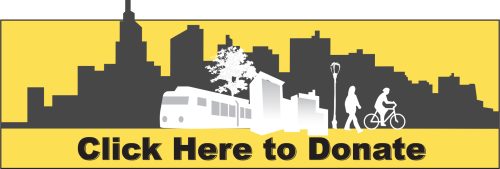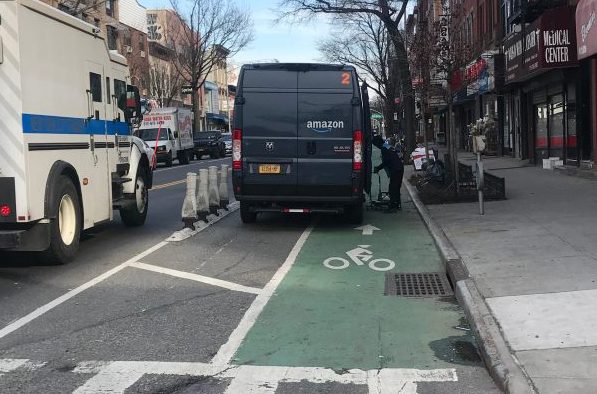
Get the facts, Mr. Mayor.
In his weekly "Ask the Mayor" segment on WNYC on Friday morning, Mayor de Blasio mischaracterized a Brooklyn Assembly Member's proposed bill to put a surcharge on non-essential online retail orders as a "tax" that "hits every single person out there" — when, in fact, the bill has exceptions in it to protect all purchases made by low-income residents and all purchases of essentials such as food and medicine, says the bill's author Assembly Member Bobby Carroll.
Carroll — whose bill was under fire earlier in the week from Rep. Alexandria Ocasio-Cortez, who similarly misrepresented it — did not want to get in a food fight with the mayor, but restated the bill's objectives in a single on-the-record comment to Streetsblog on Friday afternoon that clearly established that the mayor did not properly describe its provisions.
"This bill was introduced during the congestion pricing debate in 2019 as a way to make streets safer, the air more breathable and reduce plastic and cardboard waste," Carroll said. "From the very beginning, the bill exempted food, medicine, individuals who receive SNAP [food stamp] benefits or WIC benefits and people with disabilities — and it made it clear to exempt other essential orders. This surcharge was always aimed at non-essential items purchased on large online marketplaces like Amazon." (It would obviously apply to other mass online retailers such as Walmart and Target.)
You know why all this backlash happens when we say “Tax the Rich?”
— Alexandria Ocasio-Cortez (@AOC) December 8, 2020
Because the unquestionable norm is to tax the poor & working class.
Maybe instead of taxing people who need baby formula and essential goods, we tax those who have profited billions from a global pandemic? https://t.co/daAXNMAQD0
Lehrer: Now the New York State Senate supermajority [is] also considering a $3-per-delivery surcharge on online deliveries, other than essentials like food. Do you support that tax?
Mayor: No. I got to tell you that's unfortunately not a progressive tax. I support progressive taxation, a tax on millionaires and billionaires. Remember, Brian, shockingly, during this horrible COVID crisis Wall Street has been booming, the rich have gotten richer. It's time to ask them to pay their fair share. They haven't paid their fair share in decades. ... But something that hits every single person out there, including struggling, working people, low-income people, folks who lost their jobs that are still – who need to get packages that could mean medicine, that could mean food, it can mean all sorts of things. No, that's the wrong way to go."
Carroll thinks it is exactly the right way to go, pointing out in a recent Daily News op-ed written with Transit Union leader John Samuelsen that roughly 1.8 million packages are delivered daily in New York City — a use of the roadways that simply did not exist 20 years ago. The bill could raise $1 billion for transit, he said.
"Shopping online is cheap and convenient," Carroll wrote. "It also means more trucks clogging city traffic, slowing buses, and spewing pollution, all of which have costs of their own." The pollution is the key, he added.
"The World Economic Forum estimates the number of delivery vehicles in big cities will rise 36 percent over the next decade if gone unchecked," he wrote. "Carbon-dioxide emissions, blamed for global warming and high asthma rates in urban areas, would rise by 32 percent."
A delivery surcharge would might also encourage "the Amazons of the world" to more regularly consolidate multiple items into a single package for delivery, he added.
Street safety and environmental activists — as opposed to those in office such as the mayor and the congress woman — say they support Carroll's bill because it would help break the culture of hypocrisy that surrounds our personal behaviors.
"Everyone knows we can't get to where we need to get on climate change without some sacrifice and paying a $3 surcharge on non-essential purchases is completely reasonable. Let's not dismiss it," said Eric McClure, executive director of StreetsPAC. "The Green New Deal is great and many of us support it wholeheartedly, but it's lacking in transportation policies — and that sector creates so much of our greenhouse gas emissions.
McClure also said the Carroll bill would help local small business by encouraging local purchases.
"At this point in history, small businesses are suffering the most," he said.
Reached for comment, City Hall spokesmen Mitch Schwartz reiterated that "the mayor has been a strong advocate for higher taxes on the wealthy," and added, "the federal government should bail out the MTA. Not working New Yorkers."






